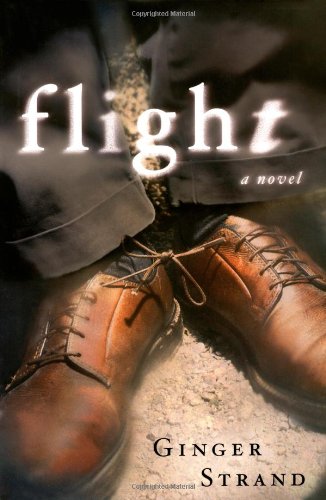Ginger Strand describes her first novel, Flight, as “the echoes and overlaps of four voices.” Meet the Gruens, the four voices in question, a Midwestern family in the midst of private dramas. Father Will, an aging airline pilot, is reluctant to retire and troubled by memories of Vietnam. Mother Carol, long-sufferer of Will’s whims, is intent on opening her very own “country-themed” bed-and-breakfast despite her disdain for things rustic. Elder daughter Margaret, a history professor, is entangled in an “open marriage.” And younger daughter Leanne, bride-to-be and owner of a “high-end craft store,” is a recovering alcoholic.
So we’ve got trouble, and Strand is adept at sketching the shifts and corrections of four self-doubting minds. The Gruens are not talkers, per se; they speak around the things most troubling, and this reticence is well played throughout. Dad drives too fast, Mom bristles and vacuums, Margaret makes lists, Leanne stares into space. Skillful with her analogies, Strand’s “echoes and overlaps” are pleasingly subtle as well. In the opening chapter, as all four voices describe the same imminent rainstorm, we understand that each particular brand of Gruen angst runs parallel but distinct.
What brings the family in close proximity is Leanne’s wedding, staged near the family farm in rural Michigan. It’s hip lately to be an unwilling bride, and Leanne certainly qualifies, scared to divulge her alcoholic past to her fiancé, Kit. In the turbulent plane ride to the wedding site, Leanne can’t help but think of collisions. (The glamour of flying is gone, she thinks. Even crashing now is “like falling off a cliff in a Greyhound bus.”) When the plane lands safely, “a single apple rolls down the aisle, and with it the old beliefs, the old certainties and expectations come crowding back into place.” This disappointment, after imagined near-disaster, serves as the novel’s most convincing theme: We shake ourselves up, we scare ourselves witless, we promise to make drastic changes and conversions—and then we land, and we settle.
Set in 2002, references to September 11 appear throughout. Will’s job makes this necessary rather than gratuitous. Despite the threats, Will still wants to fly; that is, he wants always to be in the place he’s not. When in the air, it’s the solid rootedness of earth he imagines. When on the farm he wants only to be far above. In this way he seems most like his younger daughter, craving a kind of weightlessness, a drifter’s life that doesn’t actually exist, or one he can’t realistically claim.
Unexpectedly, it is pragmatic Margaret who provides the story’s most hopeful tenet: “Perhaps the world tends not toward chaos and despair, but toward order and celebration.” And so the bride bucks up (the inevitable rain on Leanne’s wedding day isn’t ironic, just more bad weather), the older sister breaks free from her marital fix and the parents agree to disagree. But not without some degree of sacrifice. When Carol suggests a trial separation— she’ll get the country farm she never wanted and he’ll get the sky again—Will feels a familiar lurch: “This is like takeoff, something you know is going to happen but still yanks your stomach out when it does.” It’s the kind of airsickness we can probably all recall.





